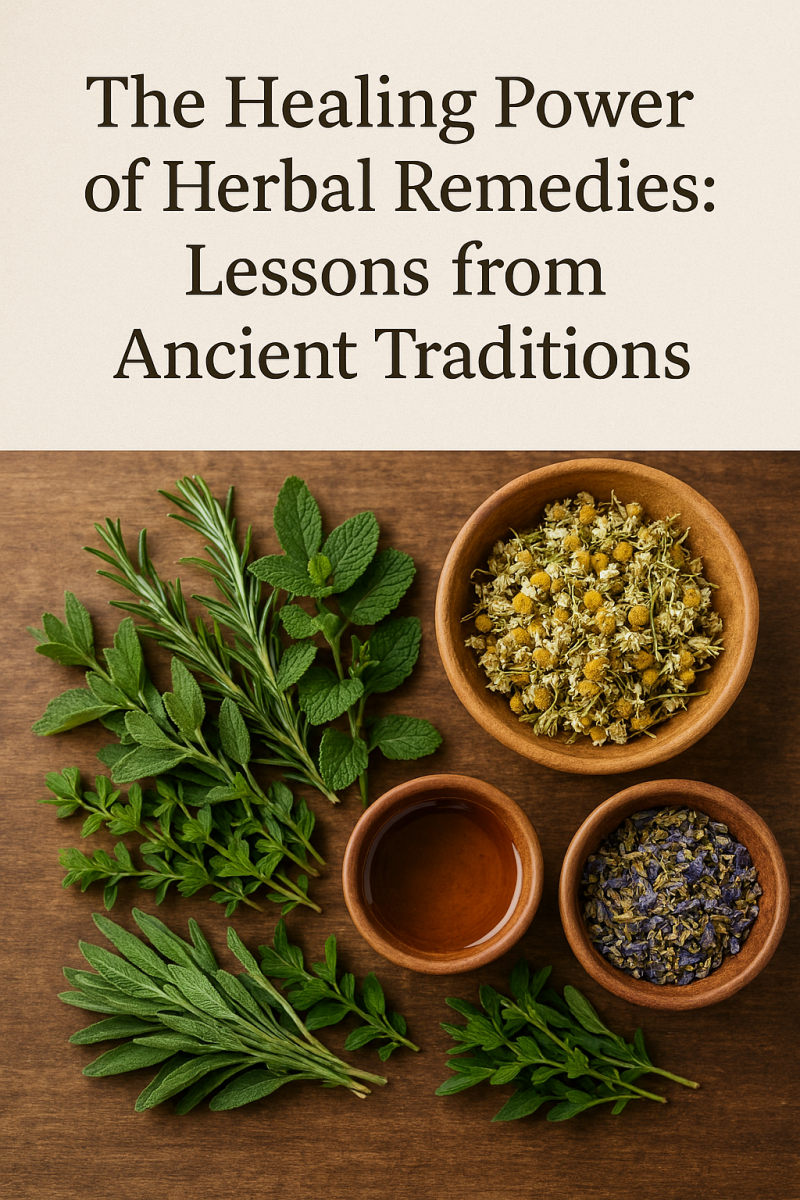
Following our exploration of holistic medicine, it’s only natural to dive deeper into one of its oldest and most enduring practices: herbal remedies. Across centuries and continents, humans have turned to plants for healing. From easing minor ailments to supporting long-term chronic conditions like diabetes, herbal medicine has been foundational in traditional healthcare systems long before modern Western medicine emerged.
A Global Tradition of Herbal Healing
1. Traditional Chinese Medicine (TCM)
TCM has been practiced for over 2,500 years and emphasizes balance—particularly the harmony of yin and yang and the flow of Qi (vital energy). Herbs are central to this system, often combined into formulas targeting specific organs or conditions.
- Ginseng (Panax ginseng): Known for boosting energy, improving immune function, and supporting blood sugar regulation.
- Cinnamon (Cinnamomum cassia): Frequently used in TCM to improve circulation and aid in glucose metabolism, which may benefit those managing diabetes.
- Bitter Melon (Momordica charantia): Used to help lower blood sugar levels. Modern studies suggest it may have compounds that mimic insulin activity.
2. Ayurveda (India)
Ayurveda, practiced for over 5,000 years, focuses on balancing the body’s three doshas: Vata, Pitta, and Kapha. Herbs are carefully selected to restore equilibrium and promote holistic wellness.
• Turmeric (Curcuma longa): Contains curcumin, which has anti-inflammatory and antioxidant properties. Widely used in India for joint pain, digestive issues, and metabolic disorders.
• Fenugreek (Trigonella foenum-graecum): Known to support blood sugar regulation and improve lipid profiles.
• Holy Basil (Ocimum sanctum, or Tulsi): Adaptogenic properties help the body manage stress, while also supporting immune and cardiovascular health.
3. Indigenous and Folk Medicine
Native cultures around the world—from North America to Africa to South America—have long relied on herbal remedies for both daily health and emergency treatments.
- Neem (Azadirachta indica, India/Africa): Traditionally used for skin issues, infections, and as a blood purifier. Some research indicates anti-diabetic potential.
- Camu Camu (Myrciaria dubia, Amazon): Rich in vitamin C and antioxidants, used traditionally to strengthen immunity.
- Echinacea (North America): Used by Native American tribes to support immune health and treat infections.
Herbal Remedies and Diabetes Management
One of the most exciting areas of herbal medicine today is its application in managing chronic conditions like diabetes. Research has identified numerous herbs that may support blood sugar control and metabolic health:
- Bitter Melon: Contains compounds that may act like insulin, lowering blood glucose levels.
- Fenugreek: Seeds are rich in soluble fiber, which can slow digestion and help regulate blood sugar.
- Cinnamon: Studies suggest it can improve insulin sensitivity and lower fasting blood glucose.
- Gymnema Sylvestre: Often called the “sugar destroyer” in Ayurvedic medicine, it may reduce sugar absorption in the gut and improve pancreatic function.
While herbal remedies can be powerful, it’s important to note that they are not replacements for prescribed medications. They can be complementary tools, often most effective when combined with lifestyle modifications like diet, exercise, and stress management.
The Science Behind Ancient Wisdom
Modern research increasingly supports the efficacy of herbal remedies. Phytochemicals—active compounds in plants—often have antioxidant, anti-inflammatory, and anti-diabetic effects. For example:
- Curcumin in turmeric has been studied for its role in reducing inflammation and supporting metabolic health.
- Polyphenols in cinnamon may improve glucose metabolism.
- Saponins in fenugreek seeds may help regulate blood sugar and cholesterol.
These discoveries reveal that ancient traditions often intuitively harnessed compounds that science is only now beginning to understand.
Safety and Considerations
Even natural remedies must be used thoughtfully. Here are some key guidelines:
- Consult Professionals: Always discuss herbal use with a qualified healthcare provider, especially if you take prescription medications.
- Dosage Matters: Too much of certain herbs can cause side effects. Follow traditional or research-backed dosage recommendations.
- Quality Counts: Use high-quality, organic herbs when possible to avoid contamination with pesticides or heavy metals.
- Complementary Approach: Herbs work best as part of a holistic lifestyle—proper nutrition, physical activity, stress management, and adequate sleep.
Bringing It All Together
Herbal remedies remind us that healing is both an art and a science. By studying the practices of TCM, Ayurveda, and indigenous cultures, we gain insight into how humans have cared for themselves long before pharmaceuticals existed. These traditions emphasize balance, prevention, and respect for the body’s natural ability to heal—principles at the heart of holistic medicine.
Whether you’re exploring herbs for general wellness, immune support, or chronic conditions like diabetes, the key is integration, education, and mindful use. Ancient wisdom and modern science together offer a powerful path to total wellness.
Add comment
Comments
Thank you for this amazing post! 🌿 I’ve always been fascinated by herbal medicine. In Sri Lanka, one traditional remedy for an upset stomach is ginger and curry leaf tea—ginger soothes the stomach, while curry leaves help with digestion. It’s incredible how many natural remedies have been passed down through generations. I’d love to see more posts exploring these traditions from different cultures!
I used to be extremely skeptical of herbal remedies, believing modern medicine was always superior. But when my wife underwent chemotherapy for cancer, she experienced severe nausea, fatigue, and digestive issues. We started incorporating herbal remedies—like ginger for nausea and turmeric for inflammation—and the improvement was remarkable. It didn’t replace her treatment, but it helped her body cope and recover more comfortably. That experience completely changed my perspective on the value of traditional herbal medicine.